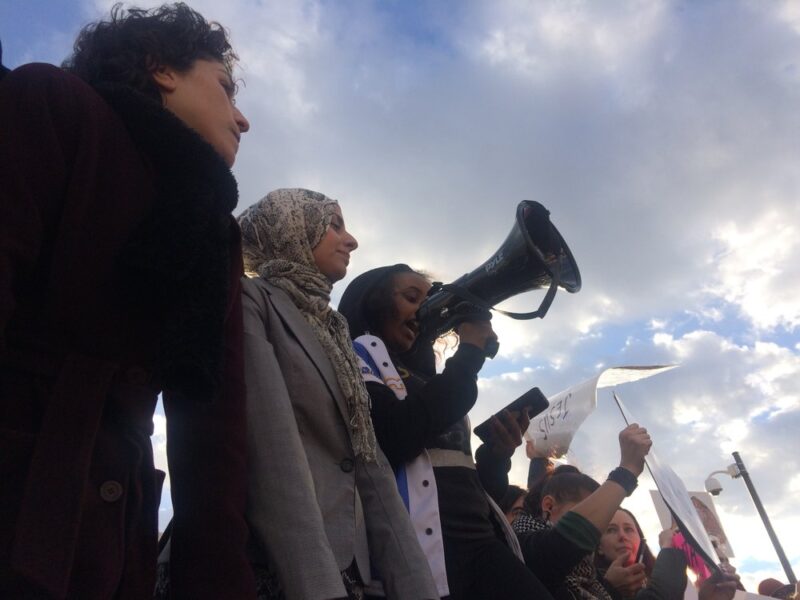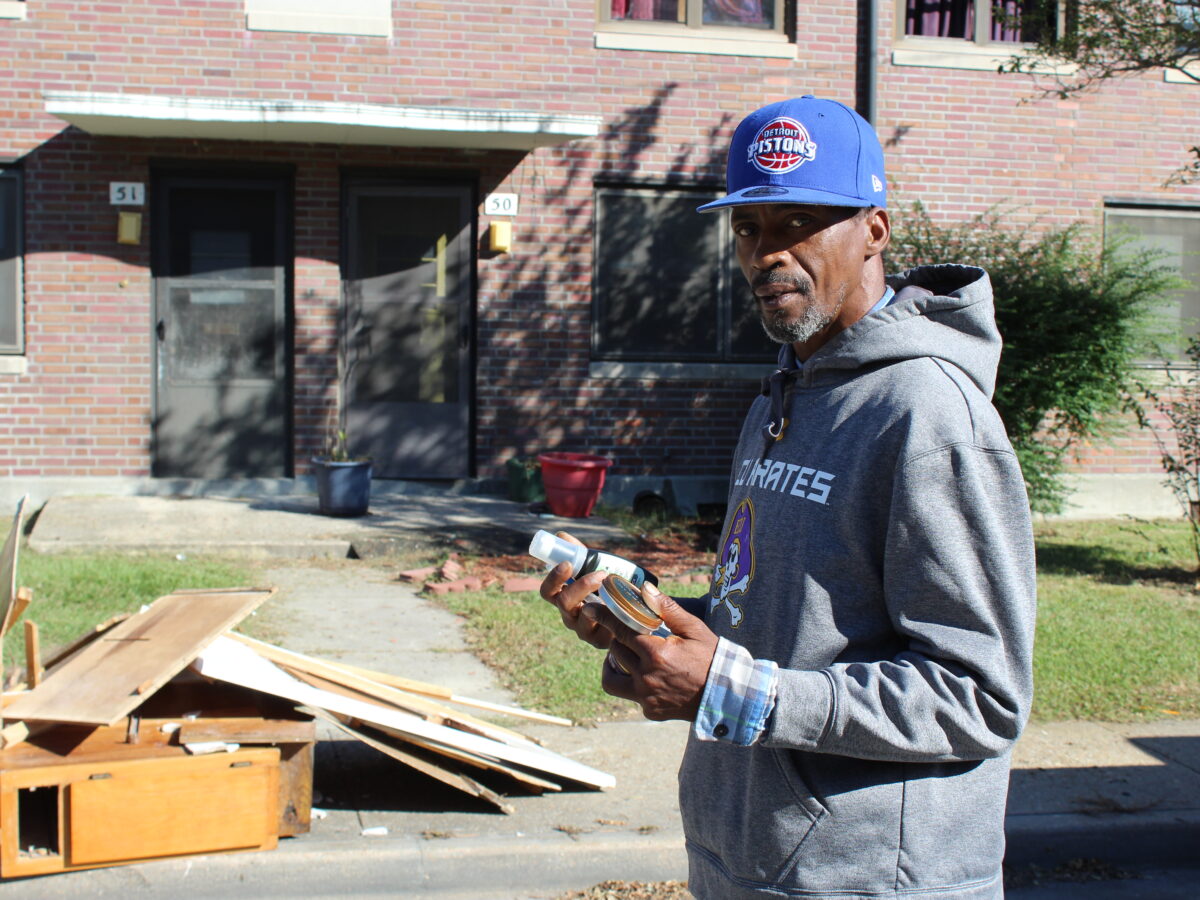This coverage was made possible by a grant through the URL Collective, a nonprofit supporting local, diverse media. Scalawag and URL Collective have partnered to bring you election reporting from grassroots media.
On February 6, 2024, for maybe the thousandth time in the decades-long existence of the Annunciation House, a volunteer opened the shelter's doors to a new arrival.
But instead of welcoming a migrant guest, as volunteers of Annunciation House's shelters have done for over 40 years, this volunteer was met with a lawsuit. Delivered by a representative of the office of Texas Attorney General Ken Paxton, the summons demanded that Annunciation House cease operation of all its migrant shelters and deliver extensive reports on all guests within 24 hours. If the organization failed to comply, the attorney general threatened, it would be shut down.
When Annunciation House refused and filed a countersuit, the state filed a second lawsuit, accusing the Catholic organization of "human smuggling," "running a stash house," and facilitating "astonishing horrors."
It was after this countersuit that my friend, Mo, who worked with me at Annunciation House in 2021 and again in the summer of 2022, called me to let me know what had happened.
A few hours after that, I texted my friend Tiff: "Do you know any lawyers? Lol"
Texas's War on the Border and Migrant Aid
The Annunciation House case follows a pattern of action by Paxton to intimidate, harass, and ultimately, disrupt the work of nonprofit organizations he disagrees with, regardless of legality or established precedent. In addition to Annunciation House, Paxton, who is currently Trump's top pick for US Attorney General, has brought suits against several other immigration nonprofits, including Catholic Charities, Rio Grande Valley, and Team Brownsville. He has also launched attacks on voting rights organizations, like the League of United Latin American Citizens (LULAC), targeting volunteers, including 87-year-old great-grandmother Lidia Martinez, and raiding their homes in the middle of the night.
Senate Bill 4, the proposed legislation introduced the day before the Annunciation House lawsuit, would change the landscape of humanitarian work at the border and shift some of the legal pretenses of Paxton and his allies into legal reality. The bill would allow law enforcement officers to detain anyone they perceive as being undocumented, allowing for racist stereotyping akin to what happened under a similar law in Arizona. It would also make it illegal to transport any individual who entered the country outside a port of entry, even if the individual entered seeking asylum and immediately turned themselves over to border patrol, as it would still be classified as an "illegal entry." The mandatory minimum for anyone found transporting an individual is 10 years of prison time.
Paxton's legal actions follow a predictable structure. They're often theatrical—for example, serving papers at a shelter's front door instead of sending an email—retaliatory, and strategically timed. The Annunciation House suit came the day after the Texas senate considered Senate Bill 4 (SB4). These lawsuits consistently frame forms of humanitarian aid and volunteer work intended to assist migrants and their communities as "criminal," recontextualizing politically neutral humanitarian causes as projects of the Biden administration and its liberal or "radical left" allies, ignoring the fact that many of these organizations have existed for years—and in Annunciation House's case, decades— before this political moment.
In my second stay at Annunciation House, I drove a Honduran man and his young son who were staying at the shelter to the local Walmart to pick up a prescription. It was hot and the line was long, so I bought us all sodas before we drove back. Under SB4, this could be considered human trafficking. Anyone in the state of Texas driving a non-citizen—whether friend, niece, nephew, great-grandparent, or otherwise—would be at risk of prosecution and incarceration.
The state's lawsuits are often filled with misinformation. Paxton attempted to criminalize dedicated employees and volunteers by misrepresenting them as savvy political agents or aggressive, "Antifa"-style strategists. In reality, these folks are suburban moms, college students, grandmothers, like Martinez, or nuns, like myself. This makes it difficult to pair them with the "astonishing horrors" they are associated with in Paxton's Annunciation House lawsuit.
"The tone of the papers [Paxton] filed is so aggressive," Jerome Wesevich, Annunciation House's pro-bono attorney, told The Texas Tribune back in February, days after the countersuit was filed. "These are church ladies."
When I first read that article, I texted my friend Mo a screenshot. Wesevich was right. Most of my work at Annunciation House had been sweeping floors and making sandwiches with sweet older nuns from Kentucky. In what world was this criminal?
Will Atlanta protect immigrants and refugees from the Trump administration?
After the executive order on immigration, protesters at Atlanta's airport had the support of local elected officials as they sought the released of detainees. Now, activists are working to make sure that local officials' commitments become real.
In the days after the suit, I alternated between fear, numbness, and frenzied research. I started listening to Paxton's interviews with conservative podcast and news hosts, where he made wildly false claims about border nonprofits, alleging that they abused government funds, encouraged voter fraud, and worked with cartels to funnel migrants across the border. I waded through Annunciation House's social media and saw echoes of these claims, reading tweet after tweet asserting Annunciation House worked with cartels and complaining about all the money being funneled into "grifter NGOs" and their fat-cat staffers.
I felt like I was going insane. The nuns and I had been distributing blankets and reheating food, not conducting back alley deals with Mexican drug lords. The first time I worked at Annunciation House, I was paid exactly $0 for three months of full-time work. I knew others who stayed for years and were paid $50 a month—just enough, the director would explain, to cover their phone bills. No one was there for the money. We were there because we wanted to be.



It turned out my friend Tiff did, in fact, know a lawyer. She told me via phone, as I paced in my partner's Brooklyn apartment, that I was fine, that the lawsuit was political theater, and the best thing to do would be to wait for the heated moment to die down.
Months later, after political and religious leaders—including El Paso's mayor who called its work invaluable, and the Pope himself who deemed Paxton's suit "sheer madness"—sided with Annunciation House, the case finally died down. In July, a judge presiding over the case dismissed the case, calling Paxton's actions "outrageous and intolerable." Despite this, Paxton has since appealed the ruling.
Paxton's Role in Manufacturing Anticipatory Obedience
But if the goal of Annunciation House V. Attorney General was to disrupt the work of welcoming migrants, it was not entirely a failure.
Paxton didn't need to win the case to inspire fear, and he didn't need to win the case to sustain his falsehoods. Even a failed lawsuit can succeed in its attempt to create the illusion of criminality and make the work of humanitarian organizations more difficult in the process.
In my attempt to better understand the felt consequences of Paxton's suit at the border, I asked Ali Boyd to hop on a Zoom. Boyd is the Director of Human Rights and Advocacy of Border Servant Corps, a shelter that works in tandem with the Annunciation House network. During our conversation she said, win or lose, Paxton's suit puts a "chilling effect" on border work, draining funds and, more crucially, time and energy.
"Even if there are no legal consequences, the damage has been done," said Boyd. "People, out of fear of the same actions happening to them, start to assume this posture of 'anticipatory obedience.'"
"Anticipatory obedience," a phrase used by Timothy Snyder in his book On Tyranny, is the phenomenon of individuals changing their behavior as a reaction to consequences that they fear will come, regardless of the present reality. People react to the threat of danger instinctually, adapting their actions to create the safest possible future for themselves. By reacting this way, Snyder argues, individuals give authoritarian governments power before it has been established.
The organization "Protect Democracy" released an article earlier this year on this phenomenon, citing Annunciation House's response as a way to "break the cycle." By filing the countersuit, author Singh Hughey argued, Annunciation House refused to react in fear, but rather, responded pro-actively, refusing to believe the false narrative propagated by Paxton and instead, behaving per the truth: that Paxton did not have the legal precedent to shut down their organization.
What Project Democracy's article failed to note is that while Annunciation House may have resisted authoritarianism on an organizational level, individuals have reacted differently to the lawsuit's narrative threat.
Since February, Annunciation House has struggled to recruit enough volunteers to sustain its operations. Several quit the same week Paxton filed his suit. One of the reasons my friend Mo texted me at all in the days after the countersuit was filed was because Annunciation House had asked them to come back to help keep an understaffed shelter program afloat.
Poor southerners are joining the globe's climate migrants
This is what climate catastrophe looks like.
Volunteers have always been the lifeblood of Annunciation House. They're more important than donations, clothes, or food, as it's the work of volunteers that keeps Annunciation House's operation running smoothly. In the face of state persecution. It is also the volunteers' anticipatory reluctance that has left the organization struggling to continue its essential work.
Paxton's anti-migrant narrative put nonprofit workers and current and ex-volunteers, like myself, in a defensive position, evident in our texting friends and asking for lawyers as we attempted to anticipate how severe the threat of real legal punishment might be. The legal reality of Paxton's suit bore little consequence for those volunteers who chose to leave. It is instead the fear it instilled that so effectively disrupted humanitarian work.
It's difficult, here, to pass blame for a human instinct. It was in response to this instinct that I, too, spent the days after the suit frantically scrolling social media and listening to conservative talk radio, trying to understand how my time at Annunciation House—something that was, to me, deeply personal and spiritually enriching—could somehow being framed as, to quote the suit, "human trafficking." I was confused and I was scared, and I wanted to know what my legal reality was, not just the narrative Paxton was trying to pawn.
I reached out to a legal expert with over 10 years of litigation experience who helped coordinate a response to Operation Lone Star. She told me this is exactly the kind of confusion Paxton wants.
"[Paxton] wants people to think that he has this power to kick your door down at any moment and scare people," said the expert, who asked to remain anonymous to avoid complications to her work. "And so he makes these baseless accusations, for example, against Annunciation House, Catholic Charities, Rio Grande Valley, and Team Brownsville, that they're engaged in human smuggling, operation of a stash house, harboring illegal aliens—and that freaks people out. They're like, 'Wait, I'm gonna go to prison.' But… he lacks authority to even be doing that from even a civil investigative perspective and courts across the state have been consistent about that."
I almost laughed when she said this in our interview. Of course Paxton didn't have this power. Of course there is no world where the Texas attorney general was going to fly to New York, pound on the door of my studio apartment in Brooklyn and demand I show up for a court date. And yet, what she was saying is exactly what a tiny part of my brain had been afraid of since back in February, when I had first sent Tiff the text. She dismissed these fears fairly quickly. "[Paxton] does not have powers to have independent criminal prosecutorial authority in Texas," she said.


But, even if Paxton doesn't have prosecutorial authority, what he does have is influence. Paxton's bluster around the issue of immigration has been in convenient tandem with the efforts of Texas' conservative right to change the legal landscape.
Truth is not mutable, but legal realities are. As SB4 and the Annunciation House case remain tied up in courts, Paxton continues his campaign of disinformation. Border order organizations are steeling themselves for an incredibly close presidential election with heightened rhetoric around border security from both candidates, with Trump already crafting the false narrative that migrants will vote illegally and steal the election from him.
The volatility of the moment makes it essential for volunteers and humanitarian workers to conduct themselves proactively, rooted in an awareness of both their work's legitimacy and its potentially tenuous legal future; without fear, but with shrewdness. Anticipatory awareness, paired with courage includes both hope for the best and a plan for the worst.
For now, Annunciation House remains open and staffed by enough volunteers to keep its day-to-day operations. If Trump is elected, however, and Ken Paxton is made our national attorney general, it is unclear what the legal future of humanitarian work may hold.



